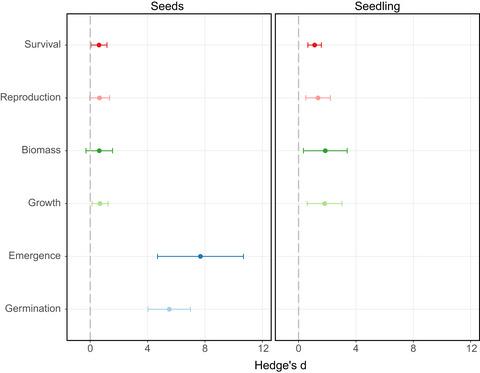Our official English website, www.x-mol.net, welcomes your feedback! (Note: you will need to create a separate account there.)
A synthesis of local adaptation to climate through reciprocal common gardens
Journal of Ecology ( IF 5.5 ) Pub Date : 2021-04-02 , DOI: 10.1111/1365-2745.13664 Christopher J Lortie 1, 2 , José L Hierro 3, 4
中文翻译:

通过互惠的公共花园综合当地对气候的适应
更新日期:2021-04-02
Journal of Ecology ( IF 5.5 ) Pub Date : 2021-04-02 , DOI: 10.1111/1365-2745.13664 Christopher J Lortie 1, 2 , José L Hierro 3, 4
Affiliation

|
- Contrasts of differences within plant species and ecotypes are often best examined in ecology, evolution and genetics through provenance and biogeographical comparisons. Climate adaptation studies in plants are no exception and benefit from experiments that use these sets of factors.
- Reciprocal common gardens are a tool used to test for local adaptation in species to different contexts including climate.
- A synthesis of common gardens and intraspecific tests for climate adaptation was used to compile over 200 studies that explored the relative efficacy of this tool and the ecology of change. Exclusion criteria were applied to review this literature and to compile specific tests that explicitly examined climate, plants and reciprocity in gardens for a total of 70 independent instances.
- A meta-analysis was used to test for consistency and significance of detecting ecotypes for the different categories of traits tested and by the transplanting of seeds or seedlings.
- This meta-analysis provides clear evidence for plant adaptation to climate change because all significant effect size estimates were positive, relatively large, and both seed and seedling transplants demonstrated consistent evidence for local adaptation. Emergence and germination responses from seed transplant experiments and relative growth and biomass differences from seedling transplants provided particularly strong support.
- Synthesis. Reciprocal common gardens were a highly effective experimental design to test for ecotypic differentiation and for climate adaptation. Nonetheless, we propose that future studies clearly define whether ecotypes are being explicitly tested in common garden experiments to enable evidence syntheses and discovery, and we highlight the need for reciprocal climatic gardens to clearly test for continued capacity for local adaptation in response to divergent climate selection processes in many plant species.
中文翻译:

通过互惠的公共花园综合当地对气候的适应
- 植物物种和生态型之间差异的对比通常通过来源和生物地理比较在生态学、进化和遗传学方面得到最好的检验。植物的气候适应研究也不例外,并从使用这些因素的实验中受益。
- 互惠公共花园是一种用于测试物种在当地适应不同环境(包括气候)的工具。
- 综合了普通花园和气候适应的种内测试,编制了 200 多项研究,探索了该工具的相对功效和变化的生态学。应用排除标准来审查这些文献并编制具体测试,明确检查花园中的气候、植物和互惠共 70 个独立实例。
- 一项荟萃分析用于测试检测不同类别性状的生态型以及通过种子或幼苗移植检测生态型的一致性和重要性。
- 这项荟萃分析为植物适应气候变化提供了明确的证据,因为所有显着影响大小的估计都是积极的、相对较大的,而且种子和幼苗移植都证明了局部适应的一致证据。种子移植实验的出苗和发芽反应以及幼苗移植的相对生长和生物量差异提供了特别有力的支持。
- 合成。互惠公共花园是一种非常有效的实验设计,用于测试生态分化和气候适应。尽管如此,我们建议未来的研究明确定义是否在普通花园实验中明确测试生态型以实现证据合成和发现,并且我们强调互惠气候花园需要明确测试当地适应不同气候选择的持续能力许多植物物种的过程。



























 京公网安备 11010802027423号
京公网安备 11010802027423号